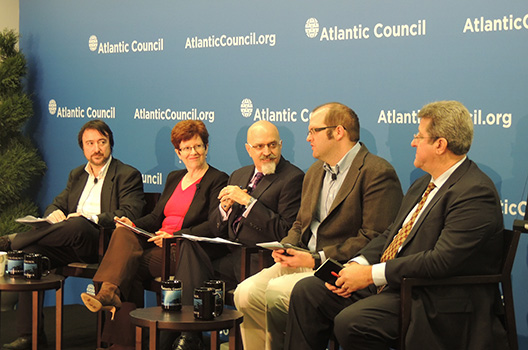 On October 8, 2014, the Cyber Statecraft Initiative hosted a panel of experts to discuss how online voting and e-voting could become a larger part of the political process in the United States and in other participatory democracies with the right security to back it up.
On October 8, 2014, the Cyber Statecraft Initiative hosted a panel of experts to discuss how online voting and e-voting could become a larger part of the political process in the United States and in other participatory democracies with the right security to back it up.
Joseph Lorenzo Hall, Chief Technologist at the Center for Democracy and Technology; Kent Landfield, Director of Standards and Technology Policy at McAfee; Jordi Puiggali CSO and SVP at Scytl; and Pamela Smith, President of Verified Voting, featured as panelists for the event. They described the current online security environment and how the necessary principles of voting in the United States, for example one person one vote, anonymity, and verifiability, are challenged by potential cyber security deficiencies. In order for voting to move to the 21st century, systems need to be designed, made, and tested to create resilient and trustworthy systems. Trust, both in the voting system and in the relationship between the government and the population, is key to achieve the acceptance of digital voting systems. The panelists agreed that this is extremely difficult to do and would take an extended amount of time, especially in a large country like the United States. Smaller countries, like Estonia, are at a distinct advantage for making e-voting a reality as their populations are smaller and so could be more quickly convinced of the security of new electoral technologies.
Panelists discussed various techniques to improve the integrity, security, and anonymity of online voting systems, such as cryptography and biometric features that are currently under development. Coupled with acceptance of new methods of voting, online voting’s potential benefits in terms of reach, access, and participation will likely have the power to revolutionize the democratic process around the world.
Representative James Langevin joined the discussion via Skype, a very fitting method of communication for a discussion about the future of digital democracy. “E-voting has incredible promise” Langevin explained “especially to the population of disabled voters.” He went on to describe that in order to unlock this promise for all voters, politicians, federal agencies, and private companies need to work together to ensure that the integrity of electoral process remains intact.
This event accompanied the release of a new Atlantic Council report, sponsored by McAfee, part of Intel Security, entitled Online Voting Rewards and Risks. This report found that many of the technologies that handle online financial transactions could be applied to make e-voting and online voting a reality in the near future.
